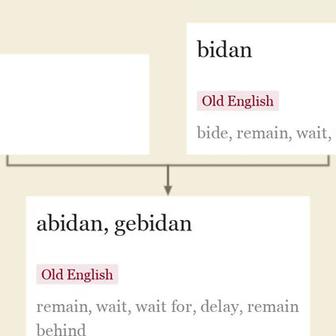bide (v.)
Middle English biden, from Old English bidan "to stay, continue, live, remain," also "to trust, rely," from Proto-Germanic *bidan "to await" (source also of Old Norse biða, Old Saxon bidan, Old Frisian bidia, Middle Dutch biden, Old High German bitan, Gothic beidan "to wait"), which is of uncertain origin. According to Watkins possibly from PIE root *bheidh- "to trust, confide, persuade" (via notion of "to await trustingly").
Frequent in Middle English (to bide on live was "stay alive;" bide in bay was "stand at bay"). It was preserved in Scotland and northern England, displaced elsewhere by abide in all senses except in the expression bide (one's) time. "I Bide My Time" is said to be "the motto of the earls of Loudon" in a Scottish context [1806, in a note to "Poetical Words of Sir David Lyndsay"], and it may owe its popularity to Scott's significant use of it in "The Bride of Lammermoor":
Ravenswood, who had assumed the disguise of a sewer upon the occasion, answered, in a stern voice, "I bide my time;" and at the same moment a bull's head, the ancient symbol of death, was placed upon the table. The explosion of the conspiracy took place upon the signal, and the usurper and his followers were put to death.
Related: Bided; biding.
Trends of bide
updated on October 09, 2022
Trending words
Dictionary entries near bide
bicycling
bicyclist
bid
bidden
biddy
bide
bidet
bidirectional
Biedermeier
biennial
biennium

